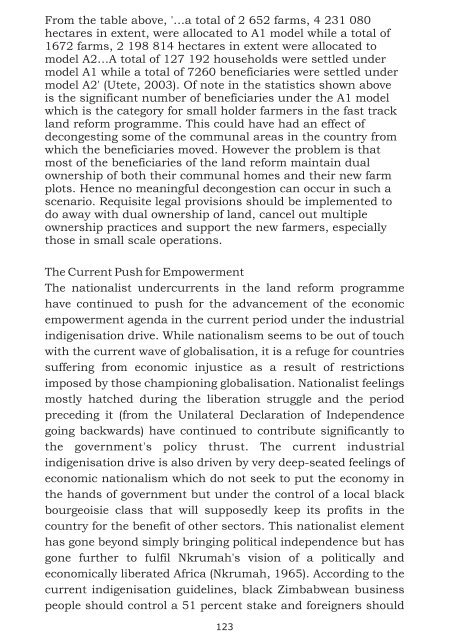Beneficiaries are actors too.pdf - Southern Institute of Peace ...
Beneficiaries are actors too.pdf - Southern Institute of Peace ...
Beneficiaries are actors too.pdf - Southern Institute of Peace ...
Create successful ePaper yourself
Turn your PDF publications into a flip-book with our unique Google optimized e-Paper software.
From the table above, '…a total <strong>of</strong> 2 652 farms, 4 231 080<br />
hect<strong>are</strong>s in extent, were allocated to A1 model while a total <strong>of</strong><br />
1672 farms, 2 198 814 hect<strong>are</strong>s in extent were allocated to<br />
model A2…A total <strong>of</strong> 127 192 households were settled under<br />
model A1 while a total <strong>of</strong> 7260 beneficiaries were settled under<br />
model A2' (Utete, 2003). Of note in the statistics shown above<br />
is the significant number <strong>of</strong> beneficiaries under the A1 model<br />
which is the category for small holder farmers in the fast track<br />
land reform programme. This could have had an effect <strong>of</strong><br />
decongesting some <strong>of</strong> the communal <strong>are</strong>as in the country from<br />
which the beneficiaries moved. However the problem is that<br />
most <strong>of</strong> the beneficiaries <strong>of</strong> the land reform maintain dual<br />
ownership <strong>of</strong> both their communal homes and their new farm<br />
plots. Hence no meaningful decongestion can occur in such a<br />
scenario. Requisite legal provisions should be implemented to<br />
do away with dual ownership <strong>of</strong> land, cancel out multiple<br />
ownership practices and support the new farmers, especially<br />
those in small scale operations.<br />
The Current Push for Empowerment<br />
The nationalist undercurrents in the land reform programme<br />
have continued to push for the advancement <strong>of</strong> the economic<br />
empowerment agenda in the current period under the industrial<br />
indigenisation drive. While nationalism seems to be out <strong>of</strong> touch<br />
with the current wave <strong>of</strong> globalisation, it is a refuge for countries<br />
suffering from economic injustice as a result <strong>of</strong> restrictions<br />
imposed by those championing globalisation. Nationalist feelings<br />
mostly hatched during the liberation struggle and the period<br />
preceding it (from the Unilateral Declaration <strong>of</strong> Independence<br />
going backwards) have continued to contribute significantly to<br />
the government's policy thrust. The current industrial<br />
indigenisation drive is also driven by very deep-seated feelings <strong>of</strong><br />
economic nationalism which do not seek to put the economy in<br />
the hands <strong>of</strong> government but under the control <strong>of</strong> a local black<br />
bourgeoisie class that will supposedly keep its pr<strong>of</strong>its in the<br />
country for the benefit <strong>of</strong> other sectors. This nationalist element<br />
has gone beyond simply bringing political independence but has<br />
gone further to fulfil Nkrumah's vision <strong>of</strong> a politically and<br />
economically liberated Africa (Nkrumah, 1965). According to the<br />
current indigenisation guidelines, black Zimbabwean business<br />
people should control a 51 percent stake and foreigners should<br />
123


